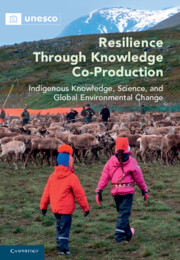 Resilience through Knowledge Co-Production
Resilience through Knowledge Co-Production from Part III - Global Change and Indigenous Responses
Published online by Cambridge University Press: 02 June 2022
Several studies have shown that indigenous peoples are among the most vulnerable to the effects of climate change, and attention has been drawn to indigenous knowledge as an important component of climate change adaptation strategies. This paper argues, however, that in order to take indigenous knowledge seriously, indigenous realities and understandings of climate change need to be taken seriously. This is because knowledge is not produced in an ontological void. Rather, knowledge is produced in relation to notions concerning the nature of reality and being. Moreover, in order not to make a mere instrumentalist use of Indigenous knowledge, this paper argues that the practical outcomes of Indigenous knowledge ought to be acknowledged, along with the ontological lifeworlds within which such knowledge is generated.
This paper is based on many years of ethnographic fieldwork with and among Aymara people in the Bolivian Andes and poses questions about how the partial connections between different ways of producing knowledge, of experiencing and explaining climate change, and of experiencing and generating realities are transformed into spaces of conflict, domination and resistance.
To save this book to your Kindle, first ensure no-reply@cambridge.org is added to your Approved Personal Document E-mail List under your Personal Document Settings on the Manage Your Content and Devices page of your Amazon account. Then enter the ‘name’ part of your Kindle email address below. Find out more about saving to your Kindle.
Note you can select to save to either the @free.kindle.com or @kindle.com variations. ‘@free.kindle.com’ emails are free but can only be saved to your device when it is connected to wi-fi. ‘@kindle.com’ emails can be delivered even when you are not connected to wi-fi, but note that service fees apply.
Find out more about the Kindle Personal Document Service.
To save content items to your account, please confirm that you agree to abide by our usage policies. If this is the first time you use this feature, you will be asked to authorise Cambridge Core to connect with your account. Find out more about saving content to Dropbox.
To save content items to your account, please confirm that you agree to abide by our usage policies. If this is the first time you use this feature, you will be asked to authorise Cambridge Core to connect with your account. Find out more about saving content to Google Drive.